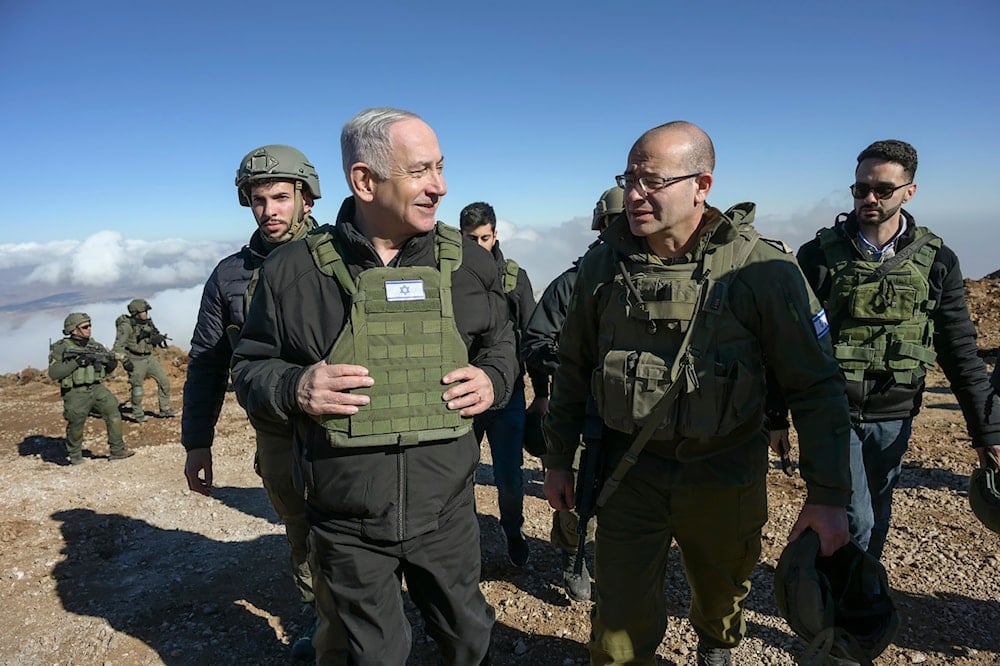Calls to expel Israeli journalist, reject Netanyahu’s plan: Syria
Israeli journalist Itai Anghel, whose past reporting has included interviews with militants from various factions, including ISIS, has drawn anger for his ties to Israeli media outlets and his controversial access to Syrian territory.
-

Israel's Prime Minister Benjamin Netanyahu, left, visits Israeli occupation forces in a buffer zone inside Syria, on Tuesday, December 17, 2024. (AP)
In a mounting wave of public outrage, Syrians are demanding the expulsion of Israeli journalist Itai Anghel, who entered Damascus to "film a documentary on post-Assad Syria".
Anghel, whose past reporting has included interviews with militants from various factions, including ISIS, has drawn anger for his ties to Israeli media outlets and his controversial access to Syrian territory.
— Itai Anghel (@itaianghel) February 23, 2025
This latest development has prompted calls for a government investigation into how such access was granted.
This demand coincides with widespread protests erupting across Syria in response to remarks made by Israeli Prime Minister Benjamin Netanyahu.
In his statement, Netanyahu called on the new Syrian government to withdraw its forces from southern Damascus and voiced concern for the Druze community in the region.
Syrians are expected to rally in several cities, including Daraa and Suwayda, to reject Netanyahu’s interventionist comments and to oppose any efforts to divide the country.
Israeli media reveals Netanyahu’s motives for disarming southern Syria
Israeli Prime Minister Benjamin Netanyahu has called for the full demilitarization of southern Syria, citing escalating security concerns over the presence of "hostile forces near Israel’s borders," Israel Hayom reported.
On his part, Israel Hayom's diplomatic analyst Ariel Kahana argued that Netanyahu's demand, which focuses on the provinces of Quneitra, Daraa, and Suwayda, is driven by fears that "internal sectarian tensions and deep-seated hostility toward Israel" could spiral into renewed instability, despite the current fragile calm in Syria.
One of "Israel’s" primary fears, Kahana said, is the uncertain authority of Syria’s new leadership under Ahmad al-Sharaa.
"He may not intend to attack Israel, but it is unclear whether he can maintain firm control over Syria for long," he stressed.
If "anti-Israel militias" emerge along the border, "it’s uncertain whether he will act against them—or even want to," Kahana further added.
Turkiye’s influence and Israeli countermeasures
A second key concern, the report suggested, is Turkiye’s growing influence in Syria. It describes Syria as effectively becoming a "protectorate" of Turkish President Recep Tayyip Erdogan, whose hostility toward "Israel is well-documented". The Israeli newspaper recalls Erdogan’s previous statements, warning that "one day, his forces will confront Israel."
To preempt such a scenario, "Israel" appears intent on enforcing a "buffer zone" in the region, as per the report.
"Israel wants to disarm an area where such a conflict could unfold," the report noted, warning of potential Turkish-backed militias forming a "hostile bloc challenging Israel."
The report also suggested that Netanyahu is presenting himself as a protector of minority groups, particularly the Druze, claiming that "Israel fosters healthy civil relations with them."
With Netanyahu making disarmament a central demand, attention now turns to how the "Syrian-Turkish authority" will respond, Kahana concludes.
Read next: 'Israel', Turkiye expand influence in post-Assad Syria: Bloomberg

 3 Min Read
3 Min Read










